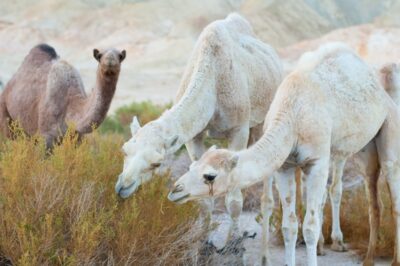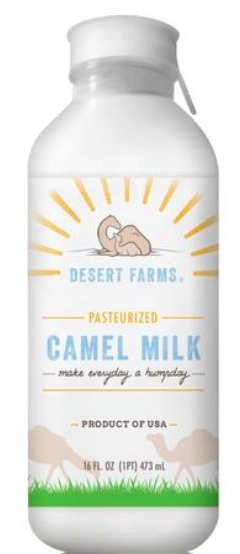The short answer to this article’s headline is—I didn’t get sick. In fact, I actually felt really, really good. And if you’ve ever known a lactose intolerant person, you know that’s a miracle.
You may be wondering why I decided to take on such a challenge if I’m lactose intolerant in the first place. I was first intrigued by camel milk when I read about Desert Farms—a company specializing in camel milk, whose commitment to sustainability and ethical practices impressed me. Not to mention, they’re selling a product I had never even heard of before.
The Camel Milk Difference
I learned that camel milk is unique in that it doesn’t contain β-lacto globulin, the allergenic component you find in cow’s milk. Camel milk is actually more similar to human milk, and doesn’t activate milk allergies.
Now my intolerance to lactose is bad, so I am always looking to try new milk substitutes when possible. But nut milks and soy milk don't pack the same nutritional punch as animal milk does, and my diet has been in dire need of a nutritional boost.
So when I found this out, I decided to craft a challenge for myself.
I decided I would drink camel’s milk for a week
I went all in on drinking camel’s milk from Desert Farms for a week to see if it lived up to the hypoallergenic hype. I was a bit skeptical at first, considering that animal milk hasn’t sat well with me for quite some time.
After a week of drinking Desert Farm’s Fresh Camel Milk, I’m sold. My stomach didn’t ache once, and actually, felt really good. I added it to my morning coffee as creamer replacement, and mixed it in with my eggs while cooking. I was beyond excited to be able to reintroduce animal milk and all the benefits that come with it into my diet.
Camel milk isn’t just useful as a milk replacement—it’s actually loaded with tons of other good stuff that your body will thank you for.
Desert Farms shared just a few of the incredible benefits you can get from drinking camel’s milk with us:
Why we’re drinking Camel Milk
1. Delivers Immune Active Whey Proteins
Camel milk is ideal because its “living components” are nearly bio-identical to that found in human colostrum. It offers optimal levels of many other beneficial components needed to support the gut, brain and the immune system. It nourishes the microbiome, with a profound effect on metabolism, immune function, genetic expression and brain chemistry.
Some of these active proteins are:
Lactoferrin: iron-binding glycoprotein, it binds metal ions which are necessary bacterial metabolites, making them unavailable for bacterial development.
Lysozyme: an enzyme that is widely found in tears, saliva and other bodily fluids. It breaks down the carbohydrates in bacterial cell walls. Lysozyme is also an antioxidant that can scavenge free radicals and reduce oxidative stress.
Proline Rich Polypeptides (PRPs): small chains of amino acids that have a powerful effect in initiating and balancing immune responses
2. Delivers IGF-1
IGF-1 plays an important role in childhood growth and has an anabolic effect in adults. Most prominently, it helps retain and increase lean muscle tissue, burn fat stores for fuel rather than muscle tissue, reduce insulin needs, balance your mood and increase strength and stamina.
3. Contains Immunoglobulins, the antibodies that maintain immune health
Camel’s milk contains significant amounts of protective proteins and immunoglobulins. High immunoglobulins reduce amount of allergic reaction and functions as antibodies, which protects immune system.
4. Delivers Antioxidants
Drinking camel’s milk increases glutathione. Cow's milk does not.
Desert farms has a natural source of glutathione that is way better and safer than artificial, manufactured glutathione product from tortilla yeast that you often see on the market.
Glutathione is a powerful antioxidant found in the body. It is vitally needed for optimum health. Low levels of glutathione in the body have been found in individuals with some health conditions.
Because oral glutathione supplements have shown limited effectiveness at raising levels of glutathione in the body, researchers have begun focusing on food sources that can promote glutathione production in the body itself.
5. Delivers Oligosaccharides
Milk oligosaccharides are complex sugars that selectively enhance the growth of specific beneficial bacteria in the gastrointestinal tract, and could be used as prebiotics.
Because oligosaccharides also aid in cell recognition and cell binding, they play a vital role in immune function.
6. Non allergenic
Neither human milk nor camel milk contain β-lacto globulin, which is considered to be an allergenic component of bovine milk. Camel milk contains no β-lacto globulin and β-casein. Because these two protein components are primarily responsible for allergies, camel milk has reduced (or no) allergic reactions.
7. Blood Sugar & Glucose
Camel milk helps maintain healthy blood sugar, maintaining glucose within a healthy range throughout the day with no extreme ups or down.
Have you tried camel milk? Let us know your experience in the comments below!



I drank camel milk in Abu Dhabi when I visited my son there, and I loved it!! It was very creamy and came in different flavors: plain, date, strawberry, chocolate. I tried them all and they were all wonderful. I also learned that the arabs fed it to their babies if the mother couldn’t nurse because it was most like mother’s milk….even better than goat milk for babies.
You didn’t mention flavor; what does it taste like?